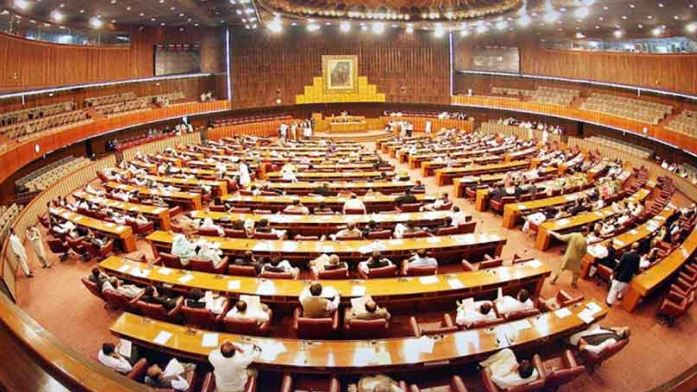ISLAMABAD, SEPT 16 (DNA) – The draft of the proposed 26th Constitutional Amendment Bill has been unveiled, while the government struggles to garner enough support in parliament to introduce changes to various articles of the Constitution.
The 31-page preliminary draft of the proposed bill consists of 56 points that propose amendments to 55 constitutional provisions.
The sessions of both the National Assembly and the Senate were set to re-convene today, as the government continued its efforts to table crucial judiciary-focused constitutional amendments. However, in a setback, the federal cabinet’s meeting scheduled for 10:30am today to approve the draft law on judicial reforms, has been postponed.
It is being said that the meeting was postponed as Maulana Fazlur Rehman refused to extend support to the bill.
Following are the main amendments proposed to various articles of the Constitution:
– Article 48: The proposed amendment states that no court, tribunal, or authority will be allowed to inquire into the advice sent by the cabinet or the prime minister to the president.
– Article 63A: Under this amendment, a member’s vote will be counted even if they vote against the direction of their parliamentary party.
– Article 78: A federal constitutional court is proposed to be established through this amendment. This court will handle constitutional matters.
– Article 175A: Judges of high courts and Shariat courts will be appointed by a commission headed by the chief justice of the Federal Constitutional Court. The commission will include two senior-most judges of the constitutional court, the chief justice of Pakistan, and two senior-most judges.
Also Read: Setback for constitutional amendments: Govt postpones cabinet meeting
The law minister, attorney general, a senior advocate, and two members of the National Assembly and Senate will also be part of the commission.
– For the appointment of judges to the Federal Constitutional Court, the commission will include three additional judges of the constitutional court instead of the chief justice of Pakistan and judges of the Supreme Court.
– For appointments to the Supreme Court, the CJP will head the commission, as well as five Supreme Court judges.
– The chief justice of the Federal Constitutional Court will be appointed on the recommendation of an eight-member National Assembly committee, which will nominate one of the three most senior judges of the court. The prime minister will forward this recommendation to the president.
– The same committee of the National Assembly will recommend the appointment of the chief justice of the Supreme Court, which will nominate one of the three most-senior judges of the court for the position. The committee will send the name to the prime minister on whose advice the president will appoint the CJP.
Also Read: ‘Constitutional package’: Haven’t received draft yet, says JUI-F’s Haideri
– The first chief justice of the constitutional court will be appointed by the president on the advice of the prime minister, while the appointments of first constitutional court judges will be made by the president in consultation with the chief Justice.
– Judges from all four provinces will have equal representation in the Federal Constitutional Court.
– The term ‘chief justice of Pakistan’ will be replaced with ‘chief justice of the Supreme Court’. Only Pakistani citizens can be appointed as judges of the Supreme Court or the Constitutional Court; no dual citizens are eligible.
– Judges of the Constitutional Court will retire at the age of 68.
– The tenure for a Supreme Court judge serving in the Constitutional Court will be three years. The term for the chief justices of both the Supreme Court and Constitutional Court will also be limited to three years.
– The Supreme Court’s power to take suo motu notice has been proposed to be transferred to the Federal Constitutional Court.
– The authority to hear the presidential reference will also be transferred from the Supreme Court to the constitutional court.
– Article 187 of the Constitution will also empower the Federal Constitutional Court. Under this article, the Supreme Court is empowered to pass any order for complete justice.
– Under the proposed amendments, the order issued under Article 187 is limited to the jurisdiction of both superior courts.
– The consent of a judge is proposed to be withdrawn for transfer to other high courts. The transfer of a judge to another high court will be decided on the recommendation of the Judicial Commission.
– All appeals related to constitutional interpretation will be transferred from the Supreme Court to the constitutional court.
– All suo motu notices being heard in the Supreme Court will also be transferred to the constitutional court.
– The cases of disputes between the federation and the provinces or between provinces will also be transferred to the constitutional court.
– Several provisions of the Supreme Court (Practice and Procedure) Act are also proposed to be made part of the Constitution.
– Benches hearing appeals on suo motu notices will become a regular part of the Constitution.

















